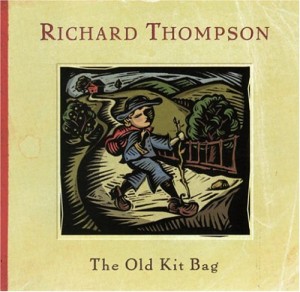
Richard’s first album of the century found him in a small label for the first time in more than two decades, and the record itself was to have a streamlined approach, with few musicians and a sound that was far removed from the layered approach that had marked/marred his 90s output. Perversely enough, the new formula worked quite magically – the record hit the Billboard Top 200, and the top 5 of the Indie charts. The truth is producer John Chelew came closer to capturing Richards’ rotund live sound than virtually anybody else – for sure much closer than Mitchell Froom.
The title of the album references a World War I song, as it is only fit since the record has a conceptual tinge of boys that grow to become soldiers only to be hit by the intricacies of destiny and the egotism and apathy of the adult world – “the fire in your eyes/how could they know”, Richard sings on the set opener, the fiercely beautiful “Gethsemane”. The first side of the record also has the Celtic-styled “One Door Opens”, probably one of the album highlights with vocalist Judith Owen (a recent associate that joins long-time bassist Danny Thompson and drummer Michael Jerome) providing a rich backdrop, something she does not only on that tune but on more than half the tracks.
This backing becomes even more noticeable in one of the closing numbers, the tension-riddled “Word Unspoken, Sight Unseen”. Richard mutes the guitar, and he lets it ring only when the intensity is such that the lyrical flow demands a sturdier backbone so that the song won’t collapse.
“Word Unspoken, Sight Unseen” is placed next to the Eastern-derived “Outside Of The Inside”, which is (appropriately enough) a song about Muslim faith and the way a radical sees Western culture.
These are my favorite songs from the album. I am also very fond of the songs “I’ll Tag Alone” (side 1) and “Pearly Jim” (side 2), although the former resembles “Crawl Back (Under My Skin)” to much lyrically, and the latter pays too close a homage to “Psycho Street” from the “Rumour And Sigh” disc. In any case, the brief guitar snippets that connect passages in “Pearly Jim” give me the willies every single time.
The rest of the disc is consistently solid – “I Have No Right To Have It All” has Richard treading the home of the blues. As you know, I have an active disliking for the genre, so it comes as no surprise that the song passes my by. And the composition that comes as side 1 is finishing (“First Breath”) is also a bit too lengthy for my liking, and the streamlined approach doesn’t work for once. But these are just personal appreciations, and I am aware many fans do cherish these songs.
With Mock Tudor, fans and critics alike noted how good Richard could sound if bells and whistles were taken away and what remained was simply the root sound. Someone who disdains unnecessary studio trickery that pimps up records like Richard (whenever possible he records in one take, with all the instruments being played at once) should never have strayed so far away production-wise. On the other hand, the excursion made him come back with so much force that long-timers were delighted and newcomers just awe-inspired. This was to be Richard’s true return to form, and the next album (“Sweet Warrior”) was to keep the momentum intact while the sound expanded to that of a full band once again.
Rating: 8/10

Pingback: Mock Tudor (Richard Thompson) – Album Review (Part 2) | MusicKO
Pingback: Sweet Warrior (Richard Thompson) – Album Review | MusicKO
Pingback: Sweet Warrior (Richard Thompson) – Album Review | MusicKO